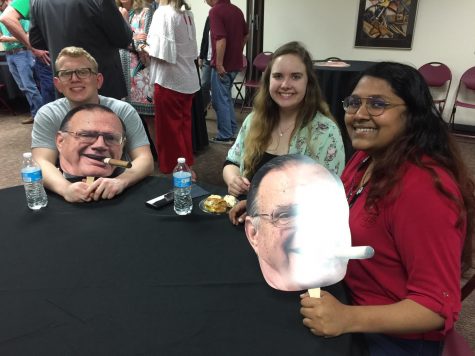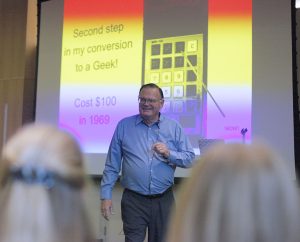Computer Science professor retires after 39 years
After 39 years of teaching, Richard Simpson, assistant professor of computer science, is ready to retire. To celebrate this and reminisce about memories together, about 10 students and 40 faculty members attended his retirement reception on April 29 in the Wichita Room of the Clark Student Center.
At the reception, Simpson said, “I am so touched by all of you being here. I have memories to last me the rest of my life.”
Ranette Halverson, chair and professor of computer science, started at the same time as Simpson in 1980. The founders of the computer science program were Halverson, Simpson, and Stewart Carpenter, a retired professor and the first professor of computer science at MSU.

Halverson said, “I never thought 39 years ago when we came into this place, not really knowing what we were facing with the new department, that we would become such good friends and work together so well. Our skills and our personalities complement each other really well.”
Halverson said her and Simpson joked that since they started together they would retire together, but she is waiting until next year to retire. She said that him staying involved with the university will make it a smoother transition for them both.
“If he were going to be gone, it would be really hard for me, but he is keeping his office. He has not even started cleaning it out. I believe that in the fall it will be business as usual except he won’t be teaching classes. I expect to see him several times a week, but it will be kind of quiet and empty up here because he is a very big part of the department.”
Simpson said he is not 100 percent excited about retiring because going to work every day is fun.
“The nice thing is I’m going to continue to do stuff here. I can do research and write software that will support the department. I want to stay attached to the department because they are my friends. I would hate for them to have a party and not invite me,” Simpson said.
Simpson said the best thing about teaching at this university is being apart of the computer science department. The faculty members attend work, conferences, birthday parties and game nights together. Some of them even raised their kids together.
“Some people might say we’re a bunch of colleagues. Well, in reality we’re a bunch of friends,” Simpson said.
At the beginning of their teaching career, Halverson and Simpson went to graduate school to prepare to teach their computer science courses, and Halverson said they studied together for every single course.
“We have pushed each other to learn and do new things over the years, somewhat out of necessity,” Halverson said.
Halverson said since his students know that education, knowledge, and learning are supreme in his mind, he is one of the most well-respected members of the department.
“Everything he does in his classes is to help his students. Sometimes they don’t like him very much because of hard projects or demanding work, but without fail he gets emails and letters every year from students who have graduated saying how his class was beneficial to their career,” Halverson said.
Matthew Schenk, a graduate student of computer science, has taken advanced algorithms, bioinformatics, and natural algorithms with Simpson as the professor. Schenk said he could have graduated in December, but he stayed to take Simpson’s last graphics class.

Schenk said, “This is his last time teaching graphics, and there are three other professors sitting in the class trying to learn from him. That’s just super cool and says a lot about how much respect he has from the faculty.”
Schenk also said it’s hard to be bored or daydream in Simpson’s class because of the way he teaches. He often calls students to the board to write code and solve problems.
“He’s very energetic and passionate. He’s 70 years old, but he’s up there and he’s making movements, and tapping on the board, and calling on students. I’m always learning and engaged,” Schenk said.
Broday Walker, graduate student of computer science, is taking Simpson’s algorithms class, and he talked about how much easier it is to understand the topic when Simpson breaks it down.
“The information can be very rigid, but he turns it into something you can hold in your mind and picture it,” Walker said. “He has great real-world examples. He explains things really well. He takes these hard algorithms and breaks them down plainly.”
Walker said if he gets stuck on a problem, Simpson gives him just enough information to lead him in the right direction rather than giving the answer away. However, Simpson has taught him more than computer science.
“He has taught me how to keep learning and always be a lifetime scholar. He’s curious about a lot of things and always learning stuff. It’s really cool to see that, and I want to be like that also.”
Walker said Simpson is a very approachable person and he enjoys the little bits of advice slipped into Simpson’s lectures.
“He’s so funny. He’s got great stories, great advice. I feel like we learn as much about life in his class as we do algorithms,” Walker said.

When describing Simpson’s character, Schenk brought up the Harry Potter costume Simpson wore to the computer science Halloween party and his infamous love for cigars.
“He is comfortable and happy with who he is. He loves teaching. He loves all of the other professors. It seems like he’s the glue that’s kind of keeping everyone together. They all connect through him some way or another,” Schenk said.
Halverson said Simpson’s positive attitude goes a long way with his students.
“Even when he is pushing you really hard, it’s almost like he makes it fun. He’s not a driving serious person. He always has a very fun ‘let’s get this done and learn something new.’ kind of attitude,” Halverson said. “His students really do love and respect him.”
Simpson said interacting with the students during lecture is one of his favorite parts of teaching.
“Over the years, there are students that have inspired me. They’re driven. They’ve gone off and worked for big companies in the United States like Microsoft, Google, and Amazon. They’re doing quite well,” Simpson said. “I love past students coming back or sending me emails that tell me all the cool things they’ve done.”
Although when he first started college, he said he didn’t like it much, he grew to like the university atmosphere.
“Over time I realized I just love hanging around universities. It’s always a pretty vibrant place. There’s always young people that are stirring the pot. Even as I grow old, I still enjoy hanging out with the young kids,” Simpson said.
Teaching algorithms was also something that took Simpson some getting used to, but now it is his favorite subject to teach along with graphics.
Simpson said, “That’s kind of what happens with anything you do. If you get better at something by hard work, you learn to love it more. That’s probably the case with algorithms with me. I have a good time teaching it.”










